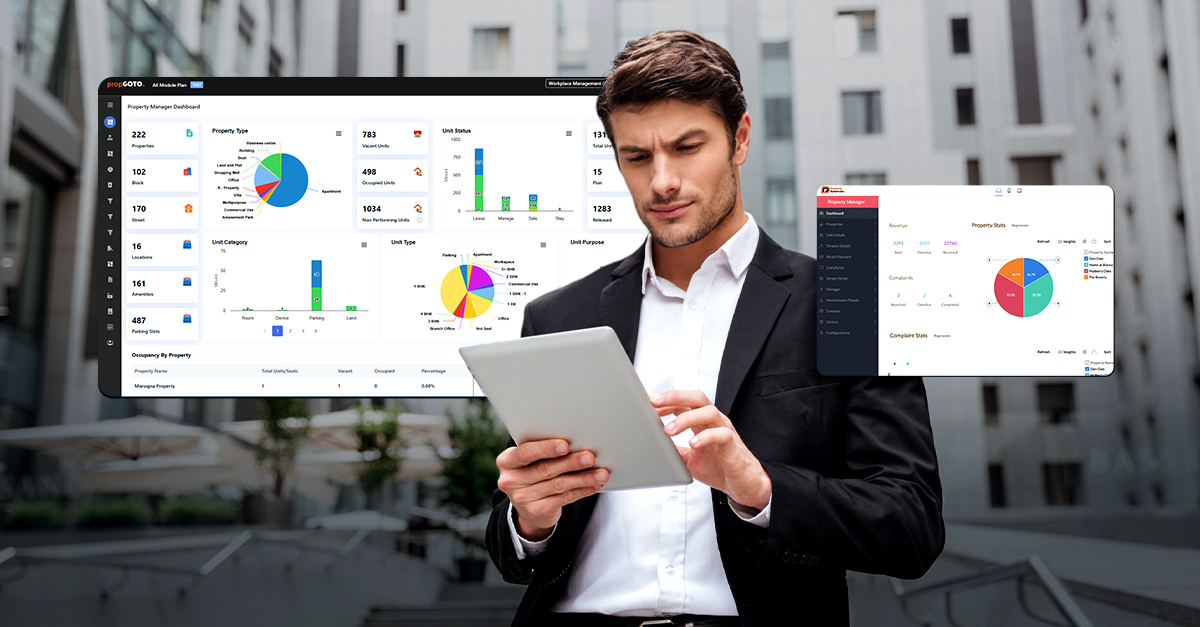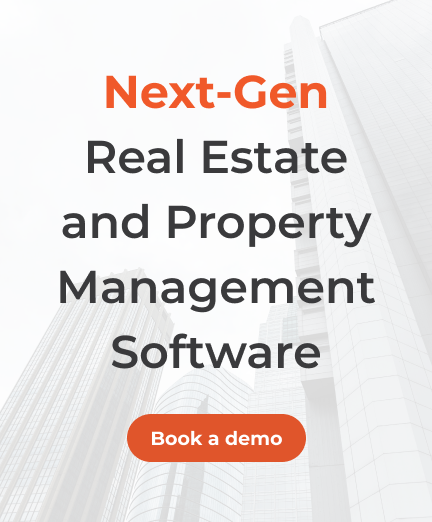Introduction
Property management software is the backbone of modern real estate operations. From managing leases and payments to handling tenant communication and maintenance, the right platform helps small teams stay organised and grow faster. But with so many tools in the market, how do you choose the right one? This guide breaks it down. Choosing the right software can make your daily tasks easier, keep tenants happy, and help your business grow. Picking the wrong one can lead to unnecessary complications and significantly impact your ROI.
A Gartner report says that while looking for software, most buyers prioritize price (49%) and security (48%). However, there are various other factors, which we will explore ahead. This blog will discuss why property management software is important and how to choose the best one for your business.
Why is property management software crucial for Real Estate Management?
Automates Tasks – Rent collection, lease renewals, and payment reminders happen effortlessly.
Streamlines Maintenance – Tracks requests, schedules inspections, and manages preventive maintenance.
Centralized Management – Stores leases, tenant details, maintenance reports, and payments in one place.
Enhances Communication – Built-in messaging keeps tenants and owners informed.
Financial Oversight – Tracks income, and expenses, and generates financial reports.
Improves Compliance – Ensures legal and regulatory requirements are met.
Reduces Errors – Minimizes human errors in financial and operational data.
Boosts Tenant Satisfaction – Faster issue resolution and better service enhance tenant retention.
Remote Accessibility – Manage properties from anywhere with cloud-based access.
Scalability – Grows with your business, managing multiple properties effortlessly.
Key Property Management Software Features to Look for
Choosing the right property management software means finding features that make managing properties easier and more efficient. Here are some key features to look for;
Tenant and Lease Tracking
The software should keep all tenant details in one place, remind you about lease renewals, track payments, handle late fees, and ensure rent is collected on time.
Accounting and Financial Management
Go for software that makes rent payments easy for tenants while also keeping track of expenses and generating financial reports. Its capability to integrate with accounting tools can make budgeting and forecasting a whole lot smoother.
Maintenance Management
The software should allow you to create and track work orders, schedule repairs, track inventory, manage preventive maintenance, and provide maintenance logs, communication tools, and performance metrics.
Document Management
With this feature, you can store all your lease agreements, contracts, and receipts in one secure spot. Digital signatures let you handle lease signings and approvals without dealing with piles of paperwork.
Reporting and Analytics
It should help you make smart decisions by providing reports and data insights. You can track property performance, generate financial reports, and customize reports to get a clear picture of areas that need improvement.
Mobile Access and App Compatibility
A mobile-friendly design allows you to access important information anytime, anywhere. The software should be compatible with multiple devices and platforms. This feature is especially useful for handling urgent tasks like approving maintenance requests, checking payment statuses, etc.
Tenant and Owner Portals
A self-service portal for tenants and property owners makes communication easier as tenants can pay rent online, request maintenance, and access lease documents. It allows property owners to track financial reports and property updates.
Resident Management
This feature offers visitor pass management, guest parking control, amenity booking, and hassle-free utility bill payments. It improves community engagement and provides quick access to emergency contacts.
Employee Management
It handles task assignments, shift scheduling, performance tracking, and incident reporting. It also provides training resources, improves communication, and includes an employee directory.
Visitor & Security Management
It registers visitors, creates access passes, and manages parking. It also helps with making announcements, controlling vendor access, and handling parcel pick-ups.
Inspection Management
It allows scheduling inspections, managing checklists, allowing photos and videos, tracking issues, generating reports, monitoring compliance, and providing access to historical data.
Workspace Management
This feature helps book desks and rooms, control access, and manage visitors. It also helps with incident reporting, provides analytics, and includes an employee directory for better organization.
Evaluating Your Business Needs to Select the Right Property Management Software
Choosing the best property management software isn’t just about finding the most popular option. It’s about finding the one that fits your business needs. Here’s how you can evaluate your needs;
Assessing Your Property Type and Size
The type and size of your property matter when picking software. Residential, commercial, and mixed-use properties all have different needs. A small, single-unit property might only need basic tracking, while a large apartment complex or office building requires advanced tools. Your software should be scalable to handle growth without needing frequent upgrades.
Determining Your Budget
Cost is another crucial factor. Some programs are free with basic features, while others require a subscription. Paid versions may include advanced features. It’s also important to check for hidden costs so you don’t end up paying more than expected.
Identifying the Must-Have Features for Your Business
It’s important to choose software that has what you need without paying for extras that you won’t use. For example, if you manage multiple properties, automation and reporting might be crucial. If you deal with a lot of tenants, a tenant portal for online payments and communication could save you time.
Comparing Popular Property Management Software Platforms
There’s a lot of software for property managers out there, and honestly, it can get confusing. Here’s a quick look at some popular choices;
AppFolio: The platform is suitable for single-family homes, multifamily units, community associations, and commercial properties.
Property Automate: Ideal for residential properties, commercial properties, community associations, coworking spaces, small businesses, and large enterprises.
Buildium: It supports residential properties, community associations, student housing, and commercial properties.
Rentec Direct: It supports single-family homes, small multifamily units, apartments, student housing, commercial properties, and affordable housing.
TenantCloud: Suitable for single-family homes, multi-unit properties, and commercial units.
Free Vs. Paid Software
If you manage only a few properties and need basic tools, free software could work. However, you might miss out on several advanced features like automation, real-time tracking, reports, integrations, etc.
Paid software is better if you manage more properties and want to save time. It offers more features, less hassle, and better support.
If you’re just starting or managing only a few properties, free software can be enough to handle simple tasks. As your portfolio grows, it’s worth upgrading to a premium platform.
How to Test and Evaluate Property Management Software?
Here are the most effective ways to test and evaluate software for property managers;
Free Trials and Demo
Property management software can be a significant investment, and choosing the wrong one can waste time, money, effort, and reputation. Testing software helps you to choose the right one. During the trial and demo, make sure that all staff members who will be using the software after implementation are present so that they understand its functionality and can provide feedback on whether it suits their daily tasks. While testing, pay attention to a few important things;
- Is the interface user-friendly?
- Does it have the tools you need for managing your properties?
- Is it fast and reliable?
Customer Support and Resources
Good customer support can save you time and stress when issues come up. Ask these questions;
- Can I get help through chat, phone, or email when I need it?
- Do they provide articles, guides, and tutorial videos to teach me how to use the software?
User Feedback and Reviews
Take time to research online reviews, ratings, feedback, and testimonials. Hearing about other users’ experiences can give you a clearer understanding of the software’s capabilities. Make sure the reviews you read are recent because software updates can change how it works.
Comparison Reviews
Look for comparison reviews from trusted sites like Software Advice, G2, and Capterra, as they show the pros and cons of different software, making it easier to choose the right one.
Real-world Insights
Talk to other property managers who use the software and look for case studies to see how the software has worked for similar businesses.
What Mistakes to Avoid When Choosing Property Management Software
- Choosing Based on Price Alone: Low-cost tools may lack critical features.
- Ignoring Team Input Your team will use the platform daily to get their feedback early.
- Skipping the Trial Always test usability before purchasing.
- Forgetting About Scalability Choose software that can grow with your business.
- Not Checking Support Weak customer service can cause costly delays.
Making the Final Decision of Choosing the Best Property Management Software
After shortlisting the top choices, now is the time to choose the best of the bunch.
Take some time to compare the pros and cons of different options. Look at the features, pricing, and user feedback.
It might be tempting to choose the cheapest option, but think beyond the initial cost. Think about the long-term benefits, not just the upfront cost.
Investing in scalable software that offers flexible plans and easy upgrades can save time and avoid unwanted hassles in the future.
Implementation and Integration of Property Management Software
Picking the right property management software is just the first step. Ensuring a smooth implementation is equally important.
Easy Integration with Other Tools and Platforms
The software should integrate well with other tools, such as accounting software, CRM, payment systems, and communication apps. A well-integrated system reduces manual work and improves team collaboration.
Training and Onboarding for Your Team
However great the tool you select, it’ll be useful only if your team knows how to use it. Proper training and onboarding help your team to understand the software and use it to reap its maximum benefit.
Conclusion
Every property manager has different requirements. Hence, it’s essential to carefully evaluate your options, test out features, and consider long-term benefits before making a final decision. Investing in the right property management software is a long-term decision tha t impacts your operations, tenant satisfaction, and overall success. Take the time to research, compare, and test your options. Start exploring today, request demos from reputed vendors, and discover the best solution to simplify your property management.
Book a Free Demo to explore the budget-friendly property management software!
FAQs
1. Can property management software handle the needs of large enterprises?
Yes, property management software is designed to meet the complex needs of large enterprises. It supports multi-property management and integrates seamlessly with other tools, and its advanced analytical and reporting capabilities provide complete visibility.
2. What are the benefits of using cloud-based property management software?
Cloud-based property management software lets you access your data from anywhere, anytime, using just an internet connection. It keeps your information safe with automatic backups and security updates. No need to download or maintain software on your computer.
3. How secure is property management software in protecting sensitive data?
Property management software keeps your data safe by using security measures to block unauthorized access. It provides role-based access, two-factor authentication, regular backups, secure servers, and frequent software updates to avoid any security risks.
4. What are the upcoming trends in property management software?
You can expect features like AI chatbots, blockchain technology for more secure payments, IoT integrations for smart property management, virtual property tours, smarter automation, and more advanced data analytics.
5. How should I decide whether cloud-based or on-premise PMS is better for my business?
Deciding between cloud-based and on-premise PMS depends on your business needs. Cloud-based PMS offers more flexibility, remote access, automatic updates, and lower upfront costs. On-premise PMS provides more control, better security, and customization, but requires higher initial investments and IT maintenance.





